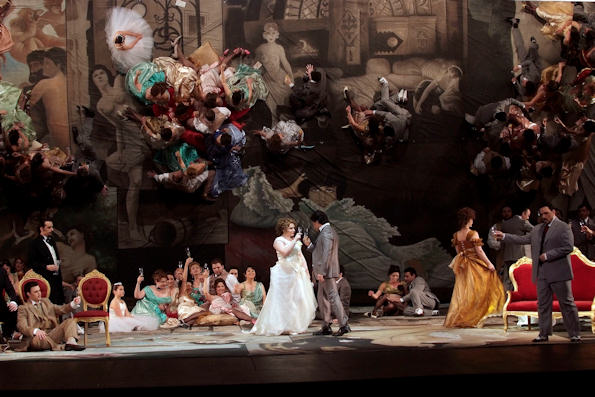Other Links
Editorial Board
- Editor - Bill Kenny
Assistant Webmaster -Stan Metzger - Founder - Len Mullenger
Google Site Search
SEEN AND HEARD INTERNATIONAL OPERA REVIEW
Verdi, La Traviata: Soloists, Orquestra de la Comunitat Valenciana. Cor de la Generalitat Valenciana, Conductor: Lorin Maazel. Palau de les Arts de Valencia. 16. 4.2010 (JMI)
Production - Asociazione Arena Sferisterio, Macerata and Fondazione Pergolesi Spontini, Jesi.
Director: Henning Brockhaus.
Sets: Josef Svoboda.
Costumes: Giancarlo Colis.
Lighting: Henning Brockhaus.
Cast:
Violetta: Hibla Gerzmava.
Alfredo: Vittorio Grigolo.
Germont: Gabriele Viviani.
Flora: Ekaterina Metlova.
Annina: María Luisa Corbacho.
Gastone: Javier Agulló.
Douphol: Andrea Porta.
D’Obigny: Abramo Rosalen.
Doctor Grenvil: Mika Kares.
Giuseppe: Manuel Beltrán Gil.

Production Picture © Tato Baeza
The official opera season in Valencia came to an en with these performances of La Traviata but in June opera returns with the ‘Festival of the Mediterranean’ where (as usual) we will have Zubin Mehta on the podium. There is an eagerly expected Salomé to look forward to as well as a luxuriously cast Carmen are in the Festival this year and I hope to be there.
The production chosen for this Traviata is the well known one by German director Henning Brockhaus. Often called the La Traviata of the Mirrors, it was premiered in the 80s at Florence’s Maggio Musicale as a vehicle for Edita Gruberova’s Violetta. At that time Josef Svoboda’s sets made a huge impact on the media, since they used large, angled, overhead mirrors to reflect the set designs painted on the floor of the stage. After years of visiting different theatres in Italy, always with great success, the production was first stored and then later destroyed. Last year however, Macerata and Jesi combined forces to rebuild the sets and so the production could travel to Valencia. Aesthetically, the production is especially appealing in both Violetta and Flora’s parties both of which have outstanding lighting by Henning Brockhaus himself. The costumes are colourful and rich for both parties, except for Violetta who is always in white.
The stage direction for this performance was generally very good but there were some weak points, especially the unfortunate way Mr. Brockhaus decided to show the opera’s last scene. Violetta’s death is the most moving moment in La Traviata but at that particular moment Mr. Brockhaus chose to move the mirror upwards while turning on the house lights so that what the audience saw was actually the orchestra pit and themselves in the stalls. Thank God, nobody started waving at their reflections in the mirror, but we lost a hugely dramatic moment and gained absolutely nothing.
Lorin Maazel was conducting for what I assume to be his last opera in this theatre as Valencia’s Musical Director. His reading was a mixture of truly great moments and others that were more tedious. Maazel has become well known for recent his tendency to choose slow tempos: on this occasion this was not wholly the case, although there were a few definite "made in Maazel" tempi, such as the Gypsy chorus. But there were also magical moments in his conducting, particularly the prelude to the fourth act and a virtually imperceptible but really beautiful orchestral accompaniment to the Duet "Parigi, o cara". Alongside these spectacular interludes, the second act was more boring than what might have been expected although (again as usual under Maazel’s baton, the orchestra was truly magnificent. There was
a fine performance too from the chorus.
Violetta was Russian soprano Hibla Gerzmava replacing Marina Rebeka. We all know that Violetta is a character that really needs two sopranos (some people say three), because moves from the lightness of the first act, through the lyricism of the second to the drama of the last. But above all Violetta needs a singer who can move an audience - without real emotion, there is no Traviata and, apart from the music and the staging, much of the excitement must come from the vocal interpretation of the character. Hibla Gerzmava was often more monotonous than exciting. Her vocal characteristics are not well suited to the first act, although she has all the notes, but her high register is somewhat metallic and loses too much quality. From there onwards the voice is better suited to the character, but Ms Gerzmava’s big problem of is the lack of varied colours in her voice. This was particularly noticeable in the second act, but also in “Addio del passato” and “Gran Dio morir si giovine”.
Alfredo was young Italian tenor Vittorio Grigolo, whom I had not heard since last year, when I saw him as Faust in this same theatre. My impression this time was not as positive as then - his tendency towards open sounds is now very marked and his singing is invariably at forte. His bright top notes were not the same either, and he had some problems in the second act caballeta. The voice has widened considerably in a short space of time - as if there were 5 years between his recent appearances instead of one - and now I find it generally less attractive. His stage ability and most attractive appearance, fortunately remain intact. Gabriele Viviani was rather an inadequate Germont although clearly a very interesting baritone with a pleasant and well managed voice. He could make an excellent Marcello or Valentin, but Papá Germont requires a voice heavier and darker than his, if he is to be credible.
In the secondary roles Ekaterina Metlova showed off a better figure than voice as Flora while María Luisa Corbacho made a good Annina. Mika Kares left a good impression as Doctor Grenvil but Javier Agulló (Gastone), Andrea Porta (Baron Douphol) and Abramo Rosalen (Marquis d' Obigny) were no more than acceptable.
There was a sold out house and very warm applause from a receptive audience. At the final bows Ms.Gerzmava – who was more than happy - was cheered, as were Lorin Maazel and his superb orchestra. Vittorio Grigolo was also warmly received.
José M Irurzun
